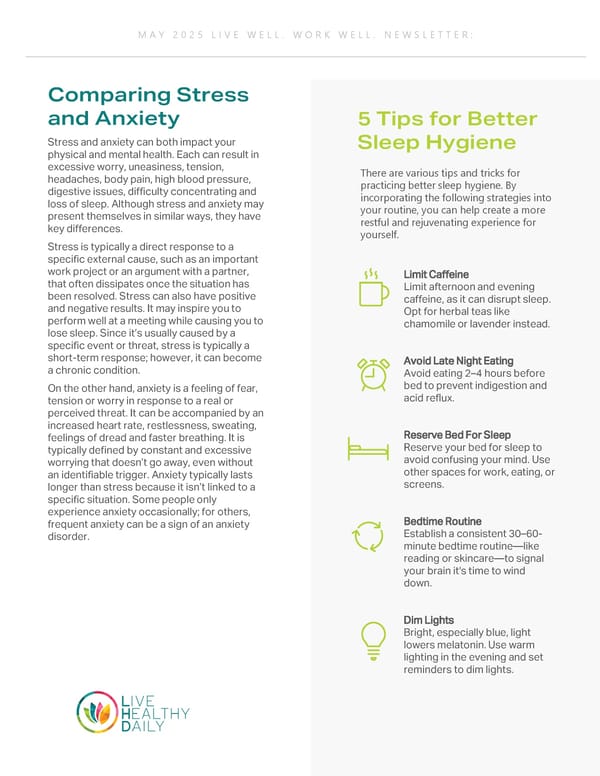M A Y 2 0 2 5 L I V E W E L L . W O R K W E L L . N E W S L E T T E R : Comparing Stress and Anxiety Stress and anxiety can both impact your physical and mental health. Each can result in excessive worry, uneasiness, tension, headaches, body pain, high blood pressure, digestive issues, difficulty concentrating and loss of sleep. Although stress and anxiety may present themselves in similar ways, they have key differences. Stress is typically a direct response to a specific external cause, such as an important work project or an argument with a partner, that often dissipates once the situation has been resolved. Stress can also have positive and negative results. It may inspire you to perform well at a meeting while causing you to lose sleep. Since it’s usually caused by a specific event or threat, stress is typically a short-term response; however, it can become a chronic condition. On the other hand, anxiety is a feeling of fear, tension or worry in response to a real or perceived threat. It can be accompanied by an increased heart rate, restlessness, sweating, feelings of dread and faster breathing. It is typically defined by constant and excessive worrying that doesn’t go away, even without an identifiable trigger. Anxiety typically lasts longer than stress because it isn’t linked to a specific situation. Some people only experience anxiety occasionally; for others, frequent anxiety can be a sign of an anxiety disorder. 5 Tips for Better Sleep Hygiene Limit Caffeine Limit afternoon and evening caffeine, as it can disrupt sleep. Opt for herbal teas like chamomile or lavender instead. Avoid Late Night Eating Avoid eating 2–4 hours before bed to prevent indigestion and acid reflux. Reserve Bed For Sleep Reserve your bed for sleep to avoid confusing your mind. Use other spaces for work, eating, or screens. Bedtime Routine Establish a consistent 30–60- minute bedtime routine—like reading or skincare—to signal your brain it's time to wind down. Dim Lights Bright, especially blue, light lowers melatonin. Use warm lighting in the evening and set reminders to dim lights. There are various tips and tricks for practicing better sleep hygiene. By incorporating the following strategies into your routine, you can help create a more restful and rejuvenating experience for yourself.
 Tips For Boosting Your Mental Health Daily Page 1
Tips For Boosting Your Mental Health Daily Page 1 